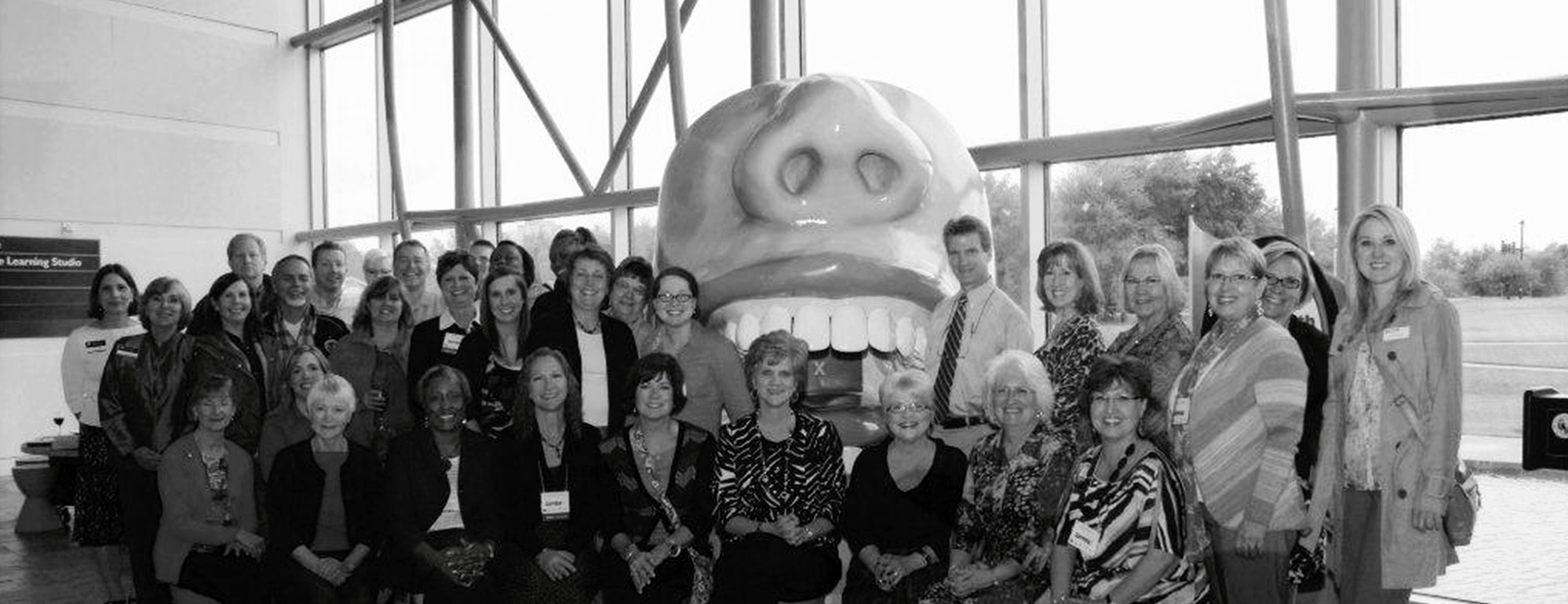
Oral Health Kansas is dedicated to promoting the importance of lifelong dental health by shaping policy and educating the public, so Kansans know that all mouths matter. Since the early 2000s oral health policy has surged into prominence in the overall health policy arena. Oral Health Kansas has played a major role in the efforts to raise the profile of oral health as a policy area and public health need in Kansas.
-
■ The newly incorporated Oral Health Kansas, Inc. began operating as the state's oral health coalition. Teresa Schwab began serving as the first Executive Director.
■ Oral Health Kansas helped establish the Bureau of Oral Health at the Kansas Department of Health and Environment. The first state Dental Director was hired.
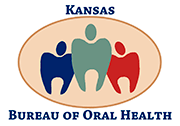
-
■ First Annual Oral Health Kansas Conference held.
-
■ Oral Health Kansas helped establish a legislative task force to explore access to care for impoverished adults.
■ Oral Health Kansas established the Dental Champions Leadership Program to create a multi-disciplinary network of people committed to improving oral health across the state.
-
■ Oral Health Kansas played a leadership role in securing appropriations and grants to establish the state's first Advanced Education in General Dentistry program at Wichita State University.
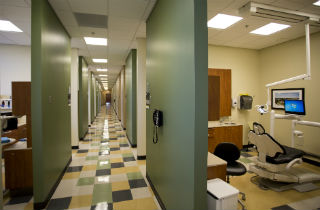
■ Working with several partners, Oral Health Kansas successfully advocated for dental services to become available to people on the Medicaid Home and Community Based Services waivers for developmental disabilities, physical disabilities, and traumatic brain injury. -
■ Oral Health Kansas successfully helped advocate for dental services to be extended to people on the Medicaid Home and Community Based Services waiver for frail elderly.
■ Oral Health Kansas participated in legislative efforts that broadened the Dental Hygienist Extended Care Permit law.
■ Oral Health Kansas produced a toolkit for the Extended Care Permit (ECP) model. It was designed to help practices understand how to incorporate ECP Hygienists and to help Dental Hygienists understand how to serve as an Extended Care provider.
■ The Bureau of Oral Health and Oral Health Kansas worked with stakeholders across the state to craft the first Kansas State Oral Health Plan.




-
■ Oral Health Kansas successfully advocated for funding for Medicaid dental services for pregnant women.
■ Oral Health Kansas began partnerships with the Kansas Council on Developmental Disabilities and the Central Plains Area Agency on Aging to teach Kansans with disabilities, older Kansans, and the people who support them about oral health care.
■ Oral Health Kansas began a project with the Bureau of Oral Health to contract with dental hygienists across the state to teach oral health skills to the parents and caregivers of children with disabilities.
■ The Kansas Dental Association and Oral Health Kansas partnered to present an Oral Health Conference. -
■ The Oral Health Kansas Board voted to no longer be a membership organization and to cultivate a network of supporters instead. The list of supporters swelled to over 1,100 people.
■ The Dental Champions Advisory Board was established to oversee the Dental Champions program and increase alumni involvement in Oral Health Kansas.
■ OHK began a weekly e-newsletter called the “Weekly Wednesday Update.”
■ The Boys & Girls Clubs of Topeka and Oral Health Kansas began a partnership to provide oral health education and career information to the children in those clubs.
■ Tanya Dorf Brunner started work as Oral Health Kansas' second Executive Director.
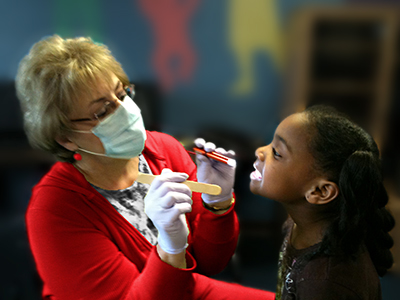
-
■ Pew Children's Dental Campaign released a report card on dental policies in each of the 50 states. Kansas received a grade of C, primarily based on too few school sealant programs, inadequate water fluoridation and low Medicaid rates for dental services.
■ Oral Health Kansas helped convene a Kansas Oral Health Planning Summit to create the second Kansas Oral Health Plan.
■ Oral Health Kansas and the Kansas Head Start Association partnered to publish a curriculum for home visitors and parent educators serving families of infants and toddlers called Teeth for Tots. In the first year, more than 400 home visitors received the training. - Continued
■ Oral Health Kansas, in partnership with Kansas Dental Association and Heartspring, a worldwide center for children with special needs, produced a video demonstrating a model to coach young people with autism the proper skills for toothbrushing.
■ Oral Health Kansas debuted a sugary drink display that is used dozens of times each year across the state to demonstrate the amount of sugar in popular beverages.
■ Oral Health Kansas became a co-founder of the new American Network of Oral Health Coalitions (ANOHC). The organization is designed to provide support and advocacy for state oral health coalitions.
-
■ Oral Health Kansas successfully advocated for significant legislative study of Medicaid dental benefits for adults.
■ Oral Health Kansas wins the Friends of the National Institute for Dental and Craniofacial Research's Media Award of Excellence.
■ Executive Director Tanya Dorf Brunner becomes the first Chair of the American Network of Oral Health Coalitions.
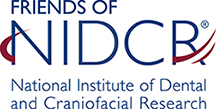
-
■ Oral Health Kansas served as the fiscal agent for the advocacy project to attempt to fluoridate the water in Wichita, Kansas.
■ Oral Health Kansas successfully advocated to include a Medicaid preventive dental benefit for adults for the state's new Medicaid managed care program, KanCare.
■ An Oral Health Caucus was launched by Oral Health Kansas to educate lawmakers about oral health issues and policy options.
■ HB 2631 passed both the House and Senate unanimously. The bill included the Extended Care Permit III that Oral Health Kansas supported as well as a provision Oral Health Kansas championed to expand access to Extended Care Permit services in schools.
■ Oral Health Kansas and the KDHE Bureau of Oral Health collaborated on the state's first evaluation of the oral health status of long-term care facility residents.
-
■ Oral Health Kansas published the 2013 Kansas Oral Health Snapshot: A Kansas County Profile.
■ The DentaQuest Foundation awarded Oral Health Kansas a planning grant to develop initiatives under the Foundation’s Oral Health 2014 project.
■ Oral Health Kansas partnered with several stakeholder organizations and launched Fluoride in Kansas, a website to inform the public about the benefits of community water fluoridation.
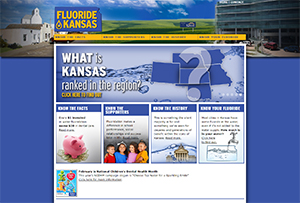
■ Oral Health Kansas became a founding member of the Johnson County Partnership for Older Adults, a collaborative group dedicated to improving the oral health of the county's seniors.
-
■ Oral Health Kansas led the advocacy effort and successfully defeated HB 2372, which would have compromised water fluoridation and misinformed consumers.
■ Oral Health Kansas received a small grant from the DentaQuest Foundation for Oral Health Kansas' Executive Director to serve on the Foundation's Midwest Regional Oral Health Connection Team, which aims to build a strong oral health network in the 12-state region.
■ Oral Health Kansas supported local advocates in Salina to defeat a ballot measure that would have ended the city's nearly 50-year practice of fluoridating their water. -
■ Oral Health Kansas joined the Midwest Collaborative Initiative, a three-state project to create, build, and sustain local community oral health coalitions.
■ Oral Health Kansas was presented with the Kansas Public Health Association's 2015 Corporate Public Health Service Award.
■ In response to the fluoridation challenges in 2014, the seventh Dental Champions class was the first to focus on a single issue. The class studied community water fluoridation and developed a series of plans to improve the fluoridation communication and education infrastructure in our state.
■ Oral Health Kansas began volunteering to conduct an exit survey at the Kansas Mission of Mercy to gather information about why people sought care at the Kansas Dental Charitable Foundation's annual free dental clinic.
-
■ Oral Health Kansas launched the Thirsty for Health project to help school districts across the state with policies, education, and communications tools to increase access K-12 students' access to drinking water during the school day.
■ Oral Health Kansas launched the Brush, Book, Bed program in Shawnee County. Brush, Book, Bed is a program of the American Academy of Pediatrics designed to help families create a healthy bedtime routine, and the Shawnee County program was the first in the nation to use Brush Book Bed in a community-based setting.
■ With support from the DentaQuest Foundation, Oral Health Kansas, Kansas Dental Association, Kansas Association for the Medically Underserved, Kansas Head Start Association, and Kansas Bureau of Oral Health formed the "Kansas Oral Health Connections" group to collaborate on advocacy and education programs. -
■
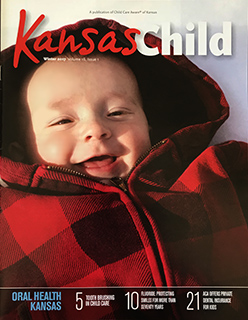 Oral Health Kansas collaborated with Child Care Aware of Kansas in producing the winter edition of Kansas Child magazine.
Oral Health Kansas collaborated with Child Care Aware of Kansas in producing the winter edition of Kansas Child magazine.
■ Oral Health Kansas and its partners in Kansas Oral Health Connections published the 2017 Kansas Oral Health Snapshot: A Kansas County Profile.
■ Twenty-three organizations joined a new Oral Health Kansas-led collaborative called the PIT (Perinatal Infant Toddler) Crew. The PIT Crew consists of organizations in Topeka and beyond to improve the oral health of pregnant women, infants and toddlers in Kansas.
-
■ In November, over 100 people gathered for a 15th Anniversary celebration for Oral Health Kansas. Watch the video below to learn more about the history and successes of Oral Health Kansas' work.
■ The annual conference was re-branded the Conference on Oral Health, and the new focus was on collaborative conversations about the most pressing public oral health issues.
-
Continued
■ Dental Program Director Kathy Hunt developed an interactive workshop for people with intellectual and developmental disabilities called "Feeling Good About Your Smile".
■ Two state contracts were awarded to Oral Health Kansas to work on education, advocacy, and community water fluoridation.
■ Dental Program Director Kathy Hunt produced the acid attack kit, a hands-on educational experience for children, organizations, and classrooms to learn how acid impacts oral health. The acid attack kit was made available on our website along with the sugary drink display.
■ Sippy, the Thirsty for Health mascot made his debut. He began making appearances at schools and health fairs across the state and even met the Kansas City Chiefs mascot, KC Wolf.
Sippy, the Thirsty for Health mascot made his debut. He began making appearances at schools and health fairs across the state and even met the Kansas City Chiefs mascot, KC Wolf.
-
■ Oral Health Kansas partnered with the Kansas Dental Association to advocate successfully for the first Medicaid dental rate increase since 2001.
■ The international Alliance for a Cavity-Free Future sponsored the ninth Dental Champions class to focus on improving access to dental care for pregnant women, infants, and toddlers.
■ Oral Health Kansas partnered with the Johnson County Oral Health Coalition on a project to bring dental hygiene care to older adults living in HUD apartment complexes. It was sponsored by the Menorah Heritage Foundation.
■ With support from the American Dental Association’s Dental Quality Alliance, Oral Health Kansas began Dental Homes for Kids, a program to improve access to Medicaid dental services for children with disabilities.
-
■ Oral Health Kansas partnered with the Kansas Dental Association to advocate successfully for the second Medicaid dental rate increase. The total two-year increase brought $6 million dollars into the dental community and resulted in an average rate increase of 11%.
■ The COVID-19 pandemic began in March, forcing Oral Health Kansas staff to quickly shift to working from home full time. Educational programs and workshops were converted to webpages or virtual presentations, and we developed a plethora of resources for consumers and providers to ensure Kansans could maintain their oral health while staying safe.
■ Due to the pandemic restricting in-person events, Oral Health Kansas hosted the first ever virtual Conference on Oral Health on October 30 and November 6.
■ Oral Health Kansas celebrated 15 years since the start of our Dental Champions Leadership Program.
-
Continued
■ Oral Health Kansas collaborated with the Kansas Health Institute on a Dental Insurance Rates and Unmet Dental Needs in Kansas Study. The results showed significant gaps in dental insurance coverage based on race and ethnicity.
■ The Feeling Good About Your Smile workshop expanded to Arkansas and Oregon.
■ Dental Program Director Kathy Hunt unveiled an online education program, Super Smiles for Your Child. The webpage, originally designed for an in-person event, is an interactive set of games and resources for families of young children and children with disabilities.

-
■ Oral Health Kansas renewed our commitment to being an inclusive organization by hiring a Diversity, Equity, and Inclusion consultant to lead staff and board through trainings and strategic planning.
■ Oral Health Kansas collaborated with the American Dental Association's Health Policy Institute on 'Estimating the Cost of Medicaid Adult Dental Benefits in Kansas'. The study found that Medicaid will save money by implementing dental coverage for adults.
■ We released the first annual Kansas Oral Health Report Card. Our state received an overall 'C' grade.
■ In response to the continued COVID-19 pandemic, Oral Health Kansas downsized from our physical office, making working from home a permanent arrangement. -
Continued
■ Oral Health Kansas began contracting with the American Fluoridation Society to support fluoridation education and advocacy in North Dakota and Idaho.
■ Oral Health Kansas began a new collaborative called the Thirsty for Health Coalition thanks to funding from American Heart Association's Voices for Healthy Kids. The coalition is working to improve access to water bottle filling stations in schools across Kansas.
Oral Health Kansas began a new collaborative called the Thirsty for Health Coalition thanks to funding from American Heart Association's Voices for Healthy Kids. The coalition is working to improve access to water bottle filling stations in schools across Kansas. -
■ Kansas Medicaid dental benefits were extended to cover adults.
■ Oral Health Kansas was selected to participate in the 100 Million Mouths Campaign, a national effort to integrate oral health into the curriculum of medical students.
■ The Cavity Free at Three in Kansas project began providing training to medical professionals in health departments and safety net clinics to integrate oral health services during medical appointments for pregnant women and families of young children.
■ Pathway to Oral Health, formerly Dental Homes for Kids, expanded to improve oral health and oral healthcare access for adults and children with disabilities.
■ The Sedation Dental Care Task Force was created to explore barriers and solutions related to sedation dental care access across the state.
■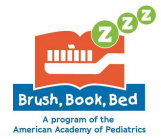 The Brush Book Bed program expanded statewide to include safety net clinics, school districts, and home visiting programs. The Brush Book Bed program expanded statewide to include safety net clinics, school districts, and home visiting programs. Funded by KDHE Bureau of Oral Health.
The Brush Book Bed program expanded statewide to include safety net clinics, school districts, and home visiting programs. The Brush Book Bed program expanded statewide to include safety net clinics, school districts, and home visiting programs. Funded by KDHE Bureau of Oral Health.
2003
■ The newly incorporated Oral Health Kansas, Inc. began operating as the state's oral health coalition. Teresa Schwab began serving as the first Executive Director.
■ Oral Health Kansas helped establish the Bureau of Oral Health at the Kansas Department of Health and Environment. The first state Dental Director was hired.

2004
■ First Annual Oral Health Kansas Conference held.
2005
■ Oral Health Kansas helped establish a legislative task force to explore access to care for impoverished adults.
■ Oral Health Kansas established the Dental Champions Leadership Program to create a multi-disciplinary network of people committed to improving oral health across the state.
2006
■ Oral Health Kansas played a leadership role in securing appropriations and grants to establish the state's first Advanced Education in General Dentistry program at Wichita State University.

■ Working with several partners, Oral Health Kansas successfully advocated for dental services to become available to people on the Medicaid Home and Community Based Services waivers for developmental disabilities, physical disabilities, and traumatic brain injury.
2007
■ Oral Health Kansas successfully helped advocate for dental services to be extended to people on the Medicaid Home and Community Based Services waiver for frail elderly.
■ Oral Health Kansas participated in legislative efforts that broadened the Dental Hygienist Extended Care Permit law.
■ Oral Health Kansas produced a toolkit for the Extended Care Permit (ECP) model. It was designed to help practices understand how to incorporate ECP Hygienists and to help Dental Hygienists understand how to serve as an Extended Care provider.
■ The Bureau of Oral Health and Oral Health Kansas worked with stakeholders across the state to craft the first Kansas State Oral Health Plan.




2008
■ Oral Health Kansas successfully advocated for funding for Medicaid dental services for pregnant women.
■ Oral Health Kansas began partnerships with the Kansas Council on Developmental Disabilities and the Central Plains Area Agency on Aging to teach Kansans with disabilities, older Kansans, and the people who support them about oral health care.
■ Oral Health Kansas began a project with the Bureau of Oral Health to contract with dental hygienists across the state to teach oral health skills to the parents and caregivers of children with disabilities.
■ The Kansas Dental Association and Oral Health Kansas partnered to present an Oral Health Conference.
2009
■ The Oral Health Kansas Board voted to no longer be a membership organization and to cultivate a network of supporters instead. The list of supporters swelled to over 1,100 people.
■ The Dental Champions Advisory Board was established to oversee the Dental Champions program and increase alumni involvement in Oral Health Kansas.
■ OHK began a weekly e-newsletter called the “Weekly Wednesday Update.”
■ The Boys & Girls Clubs of Topeka and Oral Health Kansas began a partnership to provide oral health education and career information to the children in those clubs.
■ Tanya Dorf Brunner started work as Oral Health Kansas' second Executive Director.

2010
■ Pew Children's Dental Campaign released a report card on dental policies in each of the 50 states. Kansas received a grade of C, primarily based on too few school sealant programs, inadequate water fluoridation and low Medicaid rates for dental services.
■ Oral Health Kansas helped convene a Kansas Oral Health Planning Summit to create the second Kansas Oral Health Plan.
■ Oral Health Kansas and the Kansas Head Start Association partnered to publish a curriculum for home visitors and parent educators serving families of infants and toddlers called Teeth for Tots. In the first year, more than 400 home visitors received the training.
■ Oral Health Kansas, in partnership with Kansas Dental Association and Heartspring, a worldwide center for children with special needs, produced a video demonstrating a model to coach young people with autism the proper skills for toothbrushing.
■ Oral Health Kansas debuted a sugary drink display that is used dozens of times each year across the state to demonstrate the amount of sugar in popular beverages.
■ Oral Health Kansas became a co-founder of the new American Network of Oral Health Coalitions (ANOHC). The organization is designed to provide support and advocacy for state oral health coalitions.
2011
■ Oral Health Kansas successfully advocated for significant legislative study of Medicaid dental benefits for adults.
■ Oral Health Kansas wins the Friends of the National Institute for Dental and Craniofacial Research's Media Award of Excellence.
■ Executive Director Tanya Dorf Brunner becomes the first Chair of the American Network of Oral Health Coalitions.

2012
■ Oral Health Kansas served as the fiscal agent for the advocacy project to attempt to fluoridate the water in Wichita, Kansas.
■ Oral Health Kansas successfully advocated to include a Medicaid preventive dental benefit for adults for the state's new Medicaid managed care program, KanCare.
■ An Oral Health Caucus was launched by Oral Health Kansas to educate lawmakers about oral health issues and policy options.
■ HB 2631 passed both the House and Senate unanimously. The bill included the Extended Care Permit III that Oral Health Kansas supported as well as a provision Oral Health Kansas championed to expand access to Extended Care Permit services in schools.
■ Oral Health Kansas and the KDHE Bureau of Oral Health collaborated on the state's first evaluation of the oral health status of long-term care facility residents.
2013
■ Oral Health Kansas published the 2013 Kansas Oral Health Snapshot: A Kansas County Profile.
■ The DentaQuest Foundation awarded Oral Health Kansas a planning grant to develop initiatives under the Foundation’s Oral Health 2014 project.
■ Oral Health Kansas partnered with several stakeholder organizations and launched Fluoride in Kansas, a website to inform the public about the benefits of community water fluoridation.

■ Oral Health Kansas became a founding member of the Johnson County Partnership for Older Adults, a collaborative group dedicated to improving the oral health of the county's seniors.
2014
■ Oral Health Kansas led the advocacy effort and successfully defeated HB 2372, which would have compromised water fluoridation and misinformed consumers.
■ Oral Health Kansas received a small grant from the DentaQuest Foundation for Oral Health Kansas' Executive Director to serve on the Foundation's Midwest Regional Oral Health Connection Team, which aims to build a strong oral health network in the 12-state region.
■ Oral Health Kansas supported local advocates in Salina to defeat a ballot measure that would have ended the city's nearly 50-year practice of fluoridating their water.
2015
■ Oral Health Kansas joined the Midwest Collaborative Initiative, a three-state project to create, build, and sustain local community oral health coalitions.
■ Oral Health Kansas was presented with the Kansas Public Health Association's 2015 Corporate Public Health Service Award.
■ In response to the fluoridation challenges in 2014, the seventh Dental Champions class was the first to focus on a single issue. The class studied community water fluoridation and developed a series of plans to improve the fluoridation communication and education infrastructure in our state.
■ Oral Health Kansas began volunteering to conduct an exit survey at the Kansas Mission of Mercy to gather information about why people sought care at the Kansas Dental Charitable Foundation's annual free dental clinic.
2016
■ Oral Health Kansas launched the Thirsty for Health project to help school districts across the state with policies, education, and communications tools to increase access K-12 students' access to drinking water during the school day.
■ Oral Health Kansas launched the Brush, Book, Bed program in Shawnee County. Brush, Book, Bed is a program of the American Academy of Pediatrics designed to help families create a healthy bedtime routine, and the Shawnee County program was the first in the nation to use Brush Book Bed in a community-based setting.
■ With support from the DentaQuest Foundation, Oral Health Kansas, Kansas Dental Association, Kansas Association for the Medically Underserved, Kansas Head Start Association, and Kansas Bureau of Oral Health formed the "Kansas Oral Health Connections" group to collaborate on advocacy and education programs.
2017
■  Oral Health Kansas collaborated with Child Care Aware of Kansas in producing the winter edition of Kansas Child magazine.
Oral Health Kansas collaborated with Child Care Aware of Kansas in producing the winter edition of Kansas Child magazine.
■ Oral Health Kansas and its partners in Kansas Oral Health Connections published the 2017 Kansas Oral Health Snapshot: A Kansas County Profile.
■ Twenty-three organizations joined a new Oral Health Kansas-led collaborative called the PIT (Perinatal Infant Toddler) Crew. The PIT Crew consists of organizations in Topeka and beyond to improve the oral health of pregnant women, infants and toddlers in Kansas.
2018
■ In November, over 100 people gathered for a 15th Anniversary celebration for Oral Health Kansas. Watch the video below to learn more about the history and successes of Oral Health Kansas' work.
■ The annual conference was re-branded the Conference on Oral Health, and the new focus was on collaborative conversations about the most pressing public oral health issues.
■ Dental Program Director Kathy Hunt developed an interactive workshop for people with intellectual and developmental disabilities called "Feeling Good About Your Smile".
■ Two state contracts were awarded to Oral Health Kansas to work on education, advocacy, and community water fluoridation.
■ In November, over 100 people gathered for a 15th Anniversary celebration for Oral Health Kansas. A video featuring interviews with prominent people from Oral Health Kansas' history debuted.
■ Dental Program Director Kathy Hunt produced the acid attack kit, a hands-on educational experience for children, organizations, and classrooms to learn how acid impacts oral health. The acid attack kit was made available on our website along with the sugary drink display.
■
 Sippy, the Thirsty for Health mascot made his debut. He began making appearances at schools and health fairs across the state and even met the Kansas City Chiefs mascot, KC Wolf.
Sippy, the Thirsty for Health mascot made his debut. He began making appearances at schools and health fairs across the state and even met the Kansas City Chiefs mascot, KC Wolf.2019
■ Oral Health Kansas partnered with the Kansas Dental Association to advocate successfully for the first Medicaid dental rate increase since 2001.
■ The international Alliance for a Cavity-Free Future sponsored the ninth Dental Champions class to focus on improving access to dental care for pregnant women, infants, and toddlers.
■ Oral Health Kansas partnered with the Johnson County Oral Health Coalition on a project to bring dental hygiene care to older adults living in HUD apartment complexes. It was sponsored by the Menorah Heritage Foundation.
2020
■ Oral Health Kansas partnered with the Kansas Dental Association to advocate successfully for the second Medicaid dental rate increase. The total two-year increase brought $6 million dollars into the dental community and resulted in an average rate increase of 11%.
■ The COVID-19 pandemic began in March, forcing Oral Health Kansas staff to quickly shift to working from home full time. Educational programs and workshops were converted to webpages or virtual presentations, and we developed a plethora of resources for consumers and providers to ensure Kansans could maintain their oral health while staying safe.
■ Due to the pandemic restricting in-person events, Oral Health Kansas hosted the first ever virtual Conference on Oral Health on October 30 and November 6.
■ Oral Health Kansas celebrated 15 years since the start of our Dental Champions Leadership Program.
■ Oral Health Kansas collaborated with the Kansas Health Institute on a Dental Insurance Rates and Unmet Dental Needs in Kansas Study. The results showed significant gaps in dental insurance coverage based on race and ethnicity.
■ The Feeling Good About Your Smile workshop expanded to Arkansas and Oregon.
■ Dental Program Director Kathy Hunt unveiled an online education program, Super Smiles for Your Child. The webpage, originally designed for an in-person event, is an interactive set of games and resources for families of young children and children with disabilities.

2021
■ Oral Health Kansas renewed our commitment to being an inclusive organization by hiring a Diversity, Equity, and Inclusion consultant to lead staff and board through trainings and strategic planning.
■ Oral Health Kansas collaborated with the American Dental Association's Health Policy Institute on 'Estimating the Cost of Medicaid Adult Dental Benefits in Kansas'. The study found that Medicaid will save money by implementing dental coverage for adults.
■ We released the first annual Kansas Oral Health Report Card. Our state received an overall 'C' grade.
■ In response to the continued COVID-19 pandemic, Oral Health Kansas downsized from our physical office, making working from home a permanent arrangement.
■ Oral Health Kansas concluded Dental Homes for Kids, a collaborative project to improve access to KanCare dental services for children with disabilities. The project originated as a Quality Improvement Pilot Project with the American Dental Association. Funding from Health Forward Foundation supported our work to develop resources and educational tools to break down barriers to accessing and providing dental care.
■ Oral Health Kansas began contracting with the American Fluoridation Society to support fluoridation education and advocacy in North Dakota and Idaho.
■  Oral Health Kansas began a new collaborative called the Thirsty for Health Coalition thanks to funding from American Heart Association's Voices for Healthy Kids. The coalition is working to improve access to water bottle filling stations in schools across Kansas.
Oral Health Kansas began a new collaborative called the Thirsty for Health Coalition thanks to funding from American Heart Association's Voices for Healthy Kids. The coalition is working to improve access to water bottle filling stations in schools across Kansas.
2022
■ Kansas Medicaid dental benefits were extended to cover adults.
■ Oral Health Kansas was selected to participate in the 100 Million Mouths Campaign, a national effort to integrate oral health into the curriculum of medical students.
■ The Cavity Free at Three in Kansas project began providing training to medical professionals in health departments and safety net clinics to integrate oral health services during medical appointments for pregnant women and families of young children.
■ Pathway to Oral Health, formerly Dental Homes for Kids, expanded to improve oral health and oral healthcare access for adults and children with disabilities.
■ The Sedation Dental Care Task Force was created to explore barriers and solutions related to sedation dental care access across the state.
■  The Brush Book Bed program expanded statewide to include safety net clinics, school districts, and home visiting programs. The Brush Book Bed program expanded statewide to include safety net clinics, school districts, and home visiting programs. Funded by KDHE Bureau of Oral Health.
The Brush Book Bed program expanded statewide to include safety net clinics, school districts, and home visiting programs. The Brush Book Bed program expanded statewide to include safety net clinics, school districts, and home visiting programs. Funded by KDHE Bureau of Oral Health.
